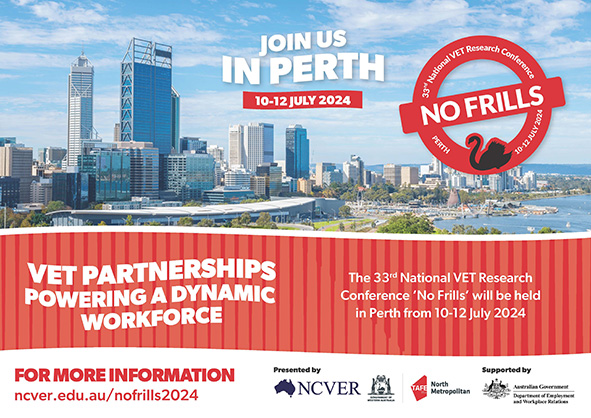In late 2022 Skills Ministers recommitted to the substantial reform of the framework for VET qualifications. To push this along a tripartite Qualification Reform Design Group has been set up to draft new rules for the development of units of competency and qualifications that reflect the differing needs of industry.
This group will comprise “members with strong VET sector experience and representation from unions, employers, a State/Territory government, and education experts.” It “will be supported by advice from a wide representation of industry stakeholders including Jobs and Skills Councils, TAFEs and RTOs, and students. Jobs and Skills Councils will be integral to the reform process, providing expert advice and leading the transition.”
The CEO of the Victorian Skills Authority, Craig Robertson has been appointed as chair, other members are:
- Sarah Brunton, National Technical Officer, Electrical Trades Union
- Helen Cooney, Principal Policy Officer, Shop, Distributive and Allied Employees’ Association
- Megan Lilly, Executive Director, Australian Industry Group
- Geoff Gwilym, Chief Executive Officer, Victorian Automotive Chamber of Commerce
- Dr Margot McNeill, Chief Product and Quality Officer TAFE NSW, Education expert
- Mathew Pearson, Director – National Skills Reform, NSW Department of Education, State and Territory nominated representative.
VET currently has around 1,200 qualifications, 1,600 skill sets, 15,000 units of competency and 670 accredited short courses and qualifications. It’s too much, it’s suggested, so reform is focused on simplification and modernisation.
According to the relevant website, qualification reform is also focused on developing a approach to developing and using qualifications which are:
- high-performing, easy to navigate, and meets the needs of employers and learners now and into the future
- supportive of innovation and excellence in training delivery and assessment
- supportive of safety and quality in training outcomes
- delivering an adaptable skilled workforce resilient to structural changes, and
- helping support more employers to use nationally recognised training.
The work of the ‘Reform Design Group’ is seen as “the first step of a multi-year program of work to deliver on the Skills Ministers’ reform ambition. Members of the Design Group will be appointed by the Minister for Skills and Training, Brendan O’Connor.” In addition, the newly established Jobs and Skills Councils will have a key role in qualifications reform by providing industry advice to the Design Group to inform the development of new training package development rules.
There has also been significant consultation on the proposed qualification reforms, which is summarised here. This involved a survey, webinars and “over 80 meetings and workshops with industry and training peaks, unions, registered training organisations, licensing bodies, regulators, [the former] Skills Services Organisations and State and Training Authorities across all states and territories.”
In essence, “many stakeholders were supportive of the shift to representing skills and knowledge at the job function level, having a distinction between base and industry-specific requirements, and supporting broader vocational outcomes through the training package.” It also noted that, because of the significant changes proposed, “significant capability building would be required to support a transition.”
Consultations also revealed divided views amongst those consulted, with some stakeholders “strongly supportive of the proposed model, [while] some others felt it did not go far enough to enable flexibility in training and assessment, [while yet] others argued that improvements would best be made within the current architecture based on units of competency in order to mitigate unintended consequences from reform.”
Usefully, the paper describes areas of broad support for the proposed approach whilst outlining ‘areas of concern’. Areas of broad agreement include the likelihood that this will result in more holistic descriptions of skills and there being “the right mix of foundational, general, and specialist skills.” A greater speed to market is also proposed.
The concern side include the possibility of increased complexity, issues about the potential impact on industrial awards, safety and licencing, questions and about how best to strike a balance between transferrable skills and industry specialist skills, as well as both (1) how important context is in the performance of a particular skill and (2) how “questions about implementation, possible timeframes, costs, and the transition approach” will be dealt with.
Let’s see where the journey takes us, though.








